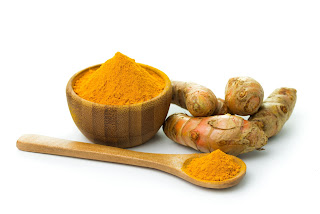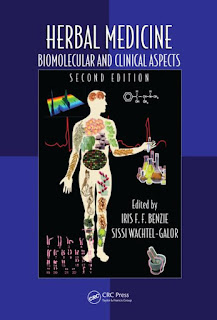 |
| Photo credit: glutenfreegigi.com |
We recently went to the Natural Expo in Los Angeles and learned all about one of the active ingredients of turmeric called curcumin. It's anti-inflammatory effects are even noted by the medical community and has been likened to the strongest pharmaceutical anti-inflammatory. This makes it perfect for reducing arthritic pain, gout and muscle pain due to injury. I've found it helpful with fibromyalgia, which is caused by an inflammatory process. This can be achieved by applying it topically or consuming it.
Personally, I'm not a fan of the flavor but that's probably because I've only tried it in smoothie drinks. I just can't gag it down. I do sprinkle a good amount on my scrambled eggs as I cook them but that's as far as I've gotten so far so I take the supplements in capsule form. I suppose I should investigate some recipes using turmeric. This one looks delicious! If you have a recipe you like, please let me know!
 |
| http://www.recipetineats.com/southern-thai-tumeric-chicken-grilled-or-baked/ |
Curcumin, as it turns out, is not easily absorbed into the bloodstream. What to do? Eat it with black pepper (it contains piperine) which is a natural substance that enhances the absorption of curcumin by 2000%. So either make sure your supplement has pepper in it or use equal amounts to your turmeric if cooking.
Add to that the fact that it's been used for over 4,000 years for medicinal purposes (and the traditional medical community has only noticed it for the past 100 years). Anything that's been used for that long has to have some solid truth behind it, right?
I found this excerpt interesting - taken from the book Herbal Medicine- Biomolecular and Clinical Aspects. (2nd edition). "Turmeric has been used in therapeutic preparations over the centuries in different parts of the world. In Ayurvedic practices, turmeric is thought to have many medicinal properties including strengthening the overall energy of the body, relieving gas, dispelling worms, improving digestion, regulating menstruation, dissolving gallstones, and relieving arthritis. Many South Asian countries use it as an antiseptic for cuts, burns, and bruises, and as an antibacterial agent. In Pakistan, it is used as an anti-inflammatory agent, and as a remedy for gastrointestinal discomfort associated with irritable bowel syndrome and other digestive disorders. In Pakistan and Afghanistan, turmeric is used to cleanse wounds and stimulate their recovery by applying it on a piece of burnt cloth that is placed over a wound. Indians use turmeric, in addition to its Ayurvedic applications, to purify blood and remedy skin conditions... Turmeric is currently used in the formulation of several sunscreens. Several multinational companies are involved in making face creams based on turmeric.
In Ayurvedic medicine, turmeric is a well-documented treatment for various respiratory conditions (e.g., asthma, bronchial hyperactivity, and allergy), as well as for liver disorders, anorexia, rheumatism, diabetic wounds, runny nose, cough, and sinusitis . In traditional Chinese medicine, it is used to treat diseases associated with abdominal pain . From ancient times, as prescribed by Ayurveda, turmeric has been used to treat sprains and swelling . In both Ayurvedic and traditional Chinese medicine, turmeric is considered a bitter digestive and a carminative. Unani practitioners also use turmeric to expel phlegm orkapha, as well as to open blood vessels in order to improve blood circulation. It can be incorporated into foods, including rice and bean dishes, to improve digestion and reduce gas and bloating. It is a cholagogue, stimulating bile production in the liver and encouraging excretion of bile via the gallbladder, which improves the body’s ability to digest fats. Sometimes, turmeric mixed with milk or water is taken to treat intestinal disorders as well as colds and sore throats."
I can't put it any better than this site called Authority Nutrition did:" Although acute (short-term) inflammation is beneficial, it can become a major problem when it is chronic (long-term) and inappropriately deployed against the body’s own tissues.
It is now believed that chronic, low-level inflammation plays a major role in almost every chronic, Western disease. This includes heart disease, cancer, metabolic syndrome, Alzheimer’s and various degenerative conditions.
Therefore, anything that can help fight chronic inflammation is of potential importance in preventing and even treating these diseases.
It turns out that curcumin is strongly anti-inflammatory, it is so powerful that it matches the effectiveness of some anti-inflammatory drugs (7).
Curcumin actually targets multiple steps in the inflammatory pathway, at the molecular level.
Curcumin blocks NF-kB, a molecule that travels into the nuclei of cells and turns on genes related to inflammation. NF-kB is believed to play a major role in many chronic diseases (8, 9).
Without getting into the gory details (inflammation is extremely complicated), the key takeaway here is that curcumin is a bioactive substance that fights inflammation at the molecular level (10, 11, 12).
In several studies, its potency has compared favorably to anti-inflammatory pharmaceutical drugs… except without the side effects (13, 14).
There's information on there about the other benefits of turmeric and I found great information here, as well:Bottom Line: Chronic inflammation is known to be a contributor to many common Western diseases. Curcumin can inhibit many molecules known to play major roles in inflammation.
Mother Nature Network
Global Healing Center
Mercola
WebMD
As always, consult your healthcare practitioner. This is not intended as medical advice but as an educational non-pharmacological alternative.


No comments:
Post a Comment